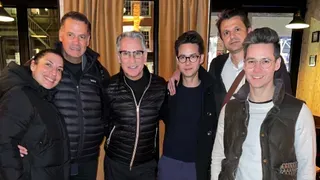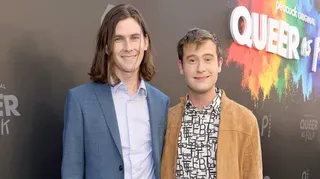September 19, 2022
2022 Toronto Int. Film Fest Diary: Entry 4 - The People's Choice
C.J. Prince READ TIME: 6 MIN.
Eleven days have come and gone and after hundreds of screenings and parties, TIFF has come to a merciful close. The final stretch is always the hardest, with the final weekend usually reserved for catching up with screenings for films missed earlier on in the festival, or hopefully catching the winner of the coveted People's Choice Award. TIFF used to be more commonly referred to as The People's Festival, and its most distinctive quality compared to other major festivals is its top prize being voted on by audience members rather than a jury. The award can double as a predictor of what film might have a good shot at winning big at the Oscars or other statues in the coming months, with past winners including Academy Award Best Picture winners "Slumdog Millionaire," "The King's Speech" and "Green Book."
It didn't come as much of a surprise that this year's winner is Steven Spielberg's "The Fabelmans," which the festival bent over backwards to ensure would go over well (it had at least six screenings compared to the two or three most films usually get). I was only able to catch one of the later screenings in the final weekend, and all the claims of this being Spielberg's most personal project to date are true given its almost autobiographical nature. It's centered around Sam Fabelman (played primarily by Gabriel LaBelle), who grows up with his three sisters, mother (Michelle Williams) and father (Paul Dano) in Arizona and California, with aspirations of becoming a director.
I should preface my thoughts on "The Fabelmans" by saying that I'm no fan of Spielberg's work, and have mostly avoided his recent output since "Lincoln." I hoped that this film might have changed things up given how personal it is for Spielberg, but it's more of the same. Told in broad strokes, basic emotional appeals and a whole lot of sentimentality, it has all the appeal of pre-chewed food (it goes down easy, if you're into that sort of thing). LaBelle is largely flat as the young Fabelman, although it's probably by design, with the rest of the cast getting moments to shine, whether it's Williams playing a tortured free spirit, or cameos from Judd Hirsch (as Sam's great uncle, whose monologue about art and pain is the best part of the whole film) and David Lynch (as John Ford, who closes the movie on a high note).
Other than that it's a lot of repetition, like the way adults continually put their hand on Sam's shoulder to impart some sort of life lesson that's bound to influence his work as a filmmaker. At the very least, there's enough here to maintain some interest in finding out more about the life of one of the most successful directors of all time, but there are limits. The film's climactic sequence, where Sam unveils his film of his senior class' day at the beach during prom, follows with the high school bully confronting him after. The bully's issue isn't that Fabelman made him look bad, though; he made him look too good, which he can't comprehend since he's spent the school year terrorizing Fabelman. It's a moment I found ludicrous and a good summation of my issues with the film and Spielberg's work in general, yet those more inclined to his storytelling approach will likely find it to be one of the highlights. In the end, the people have chosen, and I'm just one person. Take this as the biggest grain of salt, and make up your own mind.
Unfortunately, taking a less broadened approach than "The Fabelmans" when telling one's own story doesn't necessarily mean better results, which turned out to be the case for Christophe Honoré's "Winter Boy." It's a story that's also heavily influenced by the director's own experience, with the 17-year-old Lucas (Paul Kircher) pulled out of boarding school one night after his father (Honoré himself, in a small cameo) dies in a car accident. Staying almost entirely in Lucas' perspective, the film more or less observes him as he goes through the grieving process with little help aside from his mother (Juliette Binoche), as well as his brother Paul (Vincent Lacoste), who lets him stay at his apartment in Paris as a small getaway.
It's strange how, given the specificity of "Winter Boy" and how personal it is for Honoré, most of the film is emotionally inert. A large part of that is Kircher himself, whose performance doesn't really work. He's a ball of emotions and irrationality like most teenagers are, except Kircher's portrayal gets on the nerves more than it inspires any sense of sympathy. Honoré's direction lacks as well, with a reliance on handheld cameras and seemingly improvised conversations that feel like a stab at finding some authenticity to Lucas' experiences as a young, gay man discovering himself. It only works once, when Lucas' brother's roommate Lilio (Erwan Kepoa Falé) becomes a sort-of mentor which Lucas misinterprets as signs of affection. Despite all the attention put on the up-and-coming Kircher, it's Falé who walks away the breakout star thanks to his compelling performance.
Lastly, a film I caught earlier at the festival but wanted to mention since it's one of the few that's left an impression out of the 30 or so screenings I've attended: Sébastian Marnier's "The Origin of Evil" is one of the silliest films I've seen at the festival, but it's also one of the more fun times I've had. Fish factory worker Stéphane (Laure Calamy) finds herself in dire straits, which prompts her to reach out to her estranged father Serge (Jacques Weber), who invites her to his home. It turns out that the aging Serge is extremely rich, owning a large villa on an island where he lives with his wife (Dominique Blanc) and daughter (Doria Tillier), both of whom want to shove him out of the picture so they can spend his money. The lower-class Stéphane acts horrified by the lack of humanity from these upper-class types, although it turns out she might have a few secrets of her own.
The class politics of "The Origin of Evil" make it easy to label as a French version of "Parasite" but with more melodramatic twists and a sort-of trashier quality. None of those things are bad though, as Marnier leans into it with split screens and other fun visual tricks that show he's not taking it all too seriously. It's also a great showcase for Calamy, who North American viewers might recognize from the Netflix series "Call My Agent!" Her wide-eyed obliviousness to the cruelty and conniving nature of her father's family gives way to a colder and meaner tone as she learns to adapt and survive, which gives her the opportunity to sink her teeth into different facets of her character (especially when the walls start closing in on everyone). Hopefully the film will make its way to America for release in the future, as it's a fun little genre exercise with plenty of surprises in store.







